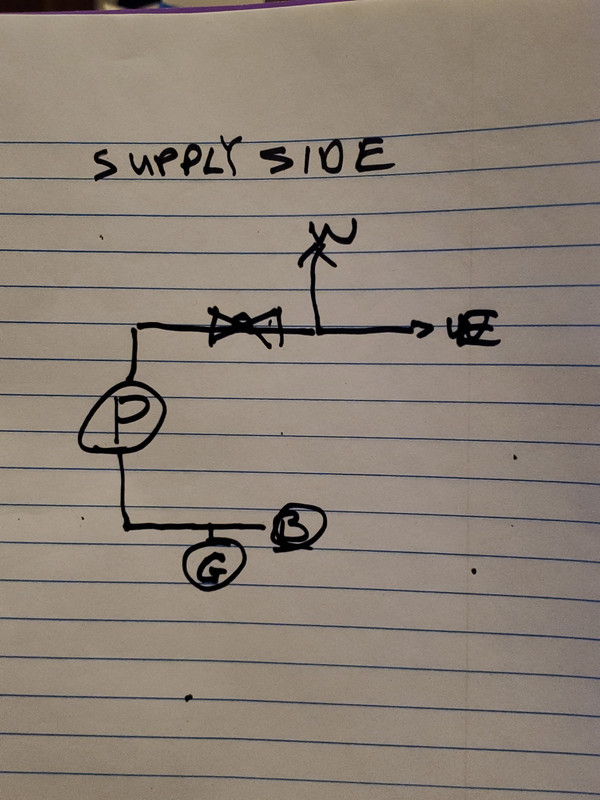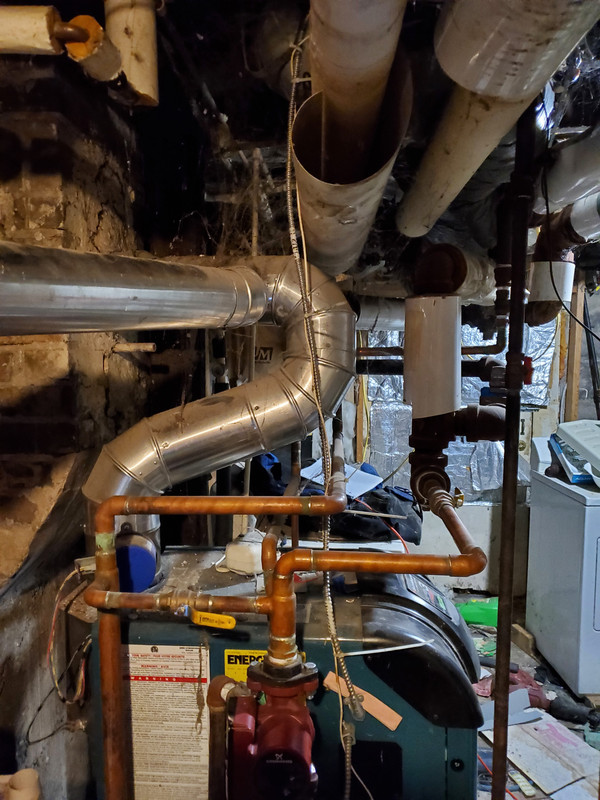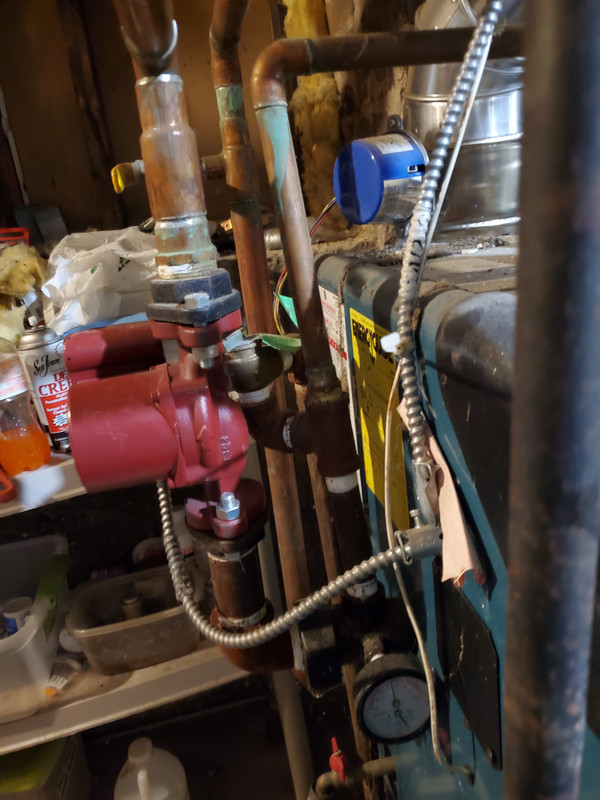Residential boiler cycling again. House cold.
In Feb 2023(?) I had an issue with my residential boiler. It was cycling and the house was cold but the radiators were warm. When the boiler temp dropped to 165 it would start up and keep running until it hit 180 then shut off. I figured out that the pump must be bad and replaced it with another Groundfos UPS15-58FC, 3-Speed Circulator Pump, 1/25 HP, 115 volt.
There is only one zone and I put the check valve in. Now the same thing is happening. I think my system is functioning like a gravity system. The pump should last more than 2 years, correct? Any chance the check valve is clogged?
If I replace the pump is there much advantage to the higher efficiency pumps? Any reason to put in the check valve?
I lack the skills to swap out the pump in a hurry and refill the system. My house is warm enough until the temp drops below zero as it has. Now I supplement with expensive electrical heaters for the next day or two..
Any thoughts? Should I wack the pump with a hammer?
Comments
-
The limit setting to 180 is supposed to stop the burner so the water does not boil. You don't want boiling steam in a hot water boiler. (12 PSI gauge water boils at 245°F). The differential on your high limit must be near 15°F. If you have baseboard 4/3" copper/Alum fin then that is normal. If you have the old gravity piping in the basement with big 'ole Cast Iron standing radiators then you may not hit the limit because of the large water content. But if you are reaching the limit and you are not getting enough heat for the home, you can increase the limit temperature to 195°F and see if that helps.
Edward Young Retired
After you make that expensive repair and you still have the same problem, What will you check next?
0 -
What is the water pressure at the boiler? Do you have the old-style steel expansion tank, or a modern bladder tank? Have you bled the radiators?
With a relatively new pump, it sounds more like you have air in the system that's preventing circulation. Post some pics of the boiler gauge close-up, and of the entire system showing the expansion tank and any air eliminators.
1 -
I have no air eliminators. I have no boiler temp or flow gauges. The boiler temp is from the LED readouts on the Burnham System 3. I have horizontal cylindrical expansion tank hung from the ceiling. There is no sight gauge to read the water level in the expansion tank.
I could bleed the radiators again.
Home owner near Minneapolis with cast iron radiators, one non working slant fin now ripped out, and hot water heat.0 -
-
-
There is a water pressure gauge where the inlet water comes in. There is no automatic fill. I turn on the water until it hits around 15 psi. At 18 psi it overflows. The house is two stories above ground with the boiler in the basement.
I have to leave the house for an errand but will take pictures when I return.
Home owner near Minneapolis with cast iron radiators, one non working slant fin now ripped out, and hot water heat.0 -
-
is there a tank in the attic? cast iron converted gravity systems can be hard on wet rotor circulators if there is a lot of rust in them. it is possible that it was just air bound when you replaced the circulator before. it will heat better by gravity if you open the flo check.
if the boiler piping isn't right the air will migrate out of the compression tank and in to the system.
1 -
The overflow at high pressure? I cannot remember I only did it once.Yes a pressure relief valve. The water pressure gauge had a red limit mark at 18 psi.
There is no tank in the attic for sure. I will take photos and make drawing later.
Home owner near Minneapolis with cast iron radiators, one non working slant fin now ripped out, and hot water heat.0 -
-
Should be able to hear if the circ. pump is running. If it quiet but hot, hit it with a hammer, after all he said Grundfos. You could check for power at the 2 wires at the circ. with a meter. I saw Burnham and digital readout. Is it an IQ system? They are notorious for electronic issues. With the boiler in the basement and he bled the rads, I don't think his problem is water, especially if he is getting some gravity flow.
0 -
If your relief valve is blowing off at 15-18 psi it’s 1 of 3 things or a combination of them. It shouldn’t blow off at 18psi
1- you have the wrong relief valve, a 15 psi and not a 30 psi relief
2- the relief valve is correct but not functioning correctly
3- your boilers gauge is broken and not reading pressure properly(probably what’s going on if I had to guess)
1 -
An ECM circ is not a good choice for a cast iron system without a healthy magnetic separator. The 15-58 is a nearly bulletproof circulator, but the check valve does not need to be there with a single zone system. Was the system working well in the meantime, even during these nasty cold days we've been having (assuming you're in MN, per the screen name)? There seems to be a bit of a pressure issue between the gauge and relief, but that would not be causing the lack of temp. Without a few temp readings, there is no way to know what the issue might be but hopefully you can get us some good photos that may reveal something. If there is still a call for heat when the boiler cuts out, the temp of the supply piping exiting the boiler should be very similar in temp to the piping entering the radiation- do you maybe have an infrared temp gun that you could use to get a baseline on those aforementioned temps? Even just by feel alone possibly?
1 -
Thanks to all. I am waiting for some photos to upload from cell phone. The latest ones are slow in coming. I also made some drawings.. I will try the listening to the pump, taking pipe temp readings, running the pump at higher speed. My recollection of the pressures may be off. The red limit indicator was what I kept below but it now fell off. I thought it was at 20 def F but I may be wrong. My pressure seems to be just below thirty.
My boiler is at the north end of the basement and feeds 2 supply mains running south, next to each other. they get smaller in diameter as they run south. I noticed that the one on the east side has old gate(?) valves on the supply main and the return main. The west supply and return look like they had valves but were replaced with plugs.
Outside temp is 42 deg F and my boiler is keeping up with 65 deg F thermostat. To stress it i will have to set it higher when I am ready.
Thanks again.
Home owner near Minneapolis with cast iron radiators, one non working slant fin now ripped out, and hot water heat.0 -
Here are photos. I split the diagram into 2 parts. Any comments appreciated. I did not solder anything. The boiler was installed like that. I had to try 3 photo sharing programs so I hope these work. Also I do not have the burnham IQ feature.
Boiler photos
Home owner near Minneapolis with cast iron radiators, one non working slant fin now ripped out, and hot water heat.0 -
Can you get a photo from farther back? Trying to put the pieces together like a puzzle is difficult. even with the diagrams I can get that you are having 2 problems.
- Not enough heat
- Relief valve releasing water/Pressure in boiler too high
Number 2 may be causing the other problem.
you need to be sure that the expansion tank has enough air in it. Air in the expansion tank is the cushion for when the water expands as it gets hotter. If there is not enough air in the tank to compress, as the water in the system expands, the pressure will get too high and the relief valve will release water on the the floor.
To get air in the expansion tank you can open a boiler drain in the system somewhere (you already have a hose on it) and let water out of the boiler. This will lower the boiler pressure to zero on the gauge. When that happens you can open the drain valve on the expansion tank just a little and you will hear Air gurgle into the tank. Open it just enough to get the air to go in as the water leaves the boiler at the bottom drain valve.
This may take 10 minutes or more. When you hear the sound of the air gurgling into the tank change, that will indicate that the tank is full of air and you can quickly close both valves. You want to pay attention to make sure you do not let too much air into the tank, because the air will start to get into the system pipes and that air will need to be removed later.
Once you have the Tank filled with air and the valves closed, you can open the fill valve and get the boiler pressure up to 12 PSI. You do not need any more than 12 PSI in your home. The tank will then start to fill with water again and compress the full tank of air to 12 PSI. That means the water in the tank will be about ⅔ full and ⅓ of compressed air at 12 PSI. That is where you want to start the boiler with cold water. Now you can turn on the burner and heat the water in the system. If the radiators only get hot across the bottom, then there is air in them and you will need to vent the radiators while adding water to keep the boiler pressure to 12 PSI. Once the system is operating with an expansion tank properly filled with air, the pressure should not get above 20 PSI and you will have a working heating system. If the house does not get warm enough with 160° water, then you can increase the boiler limit control to let the water get to 180°. If that is still not enough, then you can set the limit to 195°. But I doubt that you will need to do that.
Edward Young Retired
After you make that expensive repair and you still have the same problem, What will you check next?
1 -
I'm not a heating pro, just a homeowner/mechanical engineer with a similar expansion tank setup that had air management problems that I was able to fix after learning a lot from the helpful heating pros here.
No doubt they will have good advice for you. Meanwhile, I see a few obvious things:
- Boiler pressure gauge reads 30 psi at 140 degrees. Most residential boiler pressure relief valves are set to relieve at 30 psi, so you are perilously close to popping the relief if that gauge is correct. If your system was set up correctly, it shouldn't be above 20 psi or so at that temperature.
- You expansion tank setup is going to allow dissolved air to migrate from the tank back into the circulating water, where it will end up in your radiators and require regular bleeding. This can be fixed by replumbing the expansion tank with an Airtrol fitting, but that may not be your priority right now.
- If the 30 psi gauge is correct, it also means that your tank is probably waterlogged, ie too much water and not enough free volume left for the water to expand into. This can be remedied by draining some water out of the tank to free up more volume for expansion, but it does take a few specific steps to do correctly.
- The ease with which air from the expansion tank can migrate back into the circulating water, plus the apparent water-logging of the tank, all suggest air management problems that may be interfering with circulation.
Even if it turns out that the root cause of your problem is something else, your expansion tank/air management system could be improved if you want to not have to bleed your radiators regularly.
1 -
-
@eclecticmn, I agree with @jesmed1 on the long term air control issue/fix. But I just edited the post just before his with what you can do NOW to get up and running.
Edward Young Retired
After you make that expensive repair and you still have the same problem, What will you check next?
0 -
That's a good idea from @HVACNUT to close the bypass valve, at least for now. That should force more hot water into the supply mains and reduce the potential for short-cycling. The bypass valve is circled in red below. Right now it's fully open, meaning a good portion of your hot supply water is recycling directly back into the return instead of going out to your radiators.
Good idea also to check circulator speed and make sure it's on max.
0 -
Thanks to all. I will do these things. I never touched anything. I looked at the bypass valve but did not dare touch it. What harm would closing it have? Why is it there?
Will draining the boiler to 0 psi drain both floors'' radiators?
It is very hard to get a far away view of the system due to the walls and layout.
Home owner near Minneapolis with cast iron radiators, one non working slant fin now ripped out, and hot water heat.0 -
With that amount of water, it should've been piped P/S.
What does that mean? The amount of water in the tank/ P/S?
Home owner near Minneapolis with cast iron radiators, one non working slant fin now ripped out, and hot water heat.0 -
Don't worry about that. It's piped the way it's piped, and you can make it work the way it is.
The bypass is there to prevent too-cold water from returning to the boiler, which could cause thermal shock to the cast iron and risk cracking it (which almost never happens anymore) or could cool the boiler's exhaust gas too much, causing water vapor to condense in the exhaust stream, which can corrode the inside of the boiler.
So the mfr typically requires a bypass valve which returns some of the hot supply water back to the boiler, raising the temp of the return water.
I have two boilers where the mfr also required a bypass, but none was installed, and 30 years later the boilers are still fine. So the necessity for a bypass in some situations is debatable. The good news is that your installer did what the mfr required and installed one.
By closing the bypass valve, you force all the hot supply water to go out to your radiators, where you want it. And since your supply water is already getting fairly hot, it will still be fairly hot when it returns. I'm not an expert, but I think the rule of thumb is that as long as the return water temp gets up to 130 within 10 minutes of the boiler starting from cold, that's fine. My two boilers take even longer to reach 130 return (like 30 minutes) and as I said, they're still fine after 30 years.
To answer your question about the 0 psi, when the boiler gauge shows 0 psi, the boiler and all your pipes and radiators will still be full of water. The only thing that will have lost water is the expansion tank, because as you drain the boiler down, water from the pressurized expansion tank will be forced into the boiler to replace the water you drain, so the boiler and all the pipes and radiators will remain full. So by opening the boiler drain valve, you're actually draining the expansion tank, which is the ultimate goal.
Just follow Ed's instructions and all will be well. 😊
1 -
-
Something for the tool kit. Get a couple of boiler drain caps and gaskets to have on hand when you go to close any of those old boiler drains, especially on the expansion tank. They are notorious drippers.
Miss Hall's School service mechanic, greenhouse manager, teacher, dog walker and designated driver
1
Categories
- All Categories
- 87.5K THE MAIN WALL
- 3.3K A-C, Heat Pumps & Refrigeration
- 61 Biomass
- 430 Carbon Monoxide Awareness
- 122 Chimneys & Flues
- 2.1K Domestic Hot Water
- 5.9K Gas Heating
- 118 Geothermal
- 170 Indoor-Air Quality
- 3.8K Oil Heating
- 78 Pipe Deterioration
- 1K Plumbing
- 6.6K Radiant Heating
- 395 Solar
- 15.9K Strictly Steam
- 3.5K Thermostats and Controls
- 57 Water Quality
- 51 Industry Classes
- 51 Job Opportunities
- 18 Recall Announcements




















